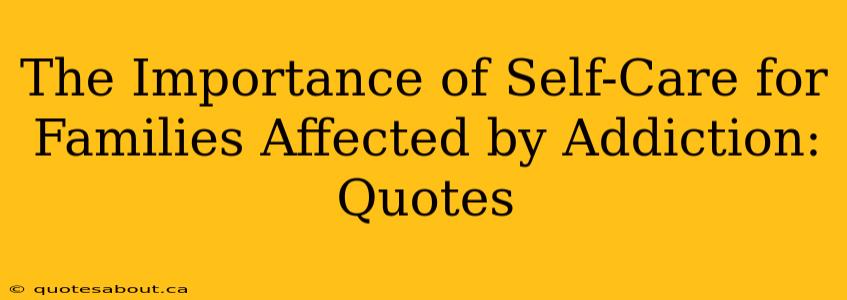Addiction impacts not just the individual struggling, but the entire family system. The emotional toll, financial strain, and disruption to daily life can be immense. Understanding the importance of self-care for families affected by addiction is crucial for navigating this challenging period and fostering healing. This isn't about selfishness; it's about equipping yourselves with the strength and resilience needed to support yourselves and your loved one.
Why Self-Care Matters for Families Facing Addiction
Neglecting self-care during this stressful time can exacerbate existing problems and create new ones. Burnout, depression, anxiety, and physical health issues are common among family members of addicts. Prioritizing self-care, however, doesn't diminish your commitment to supporting your loved one; instead, it enhances your ability to do so effectively. When you take care of yourselves, you're better equipped to handle the emotional rollercoaster, make sound decisions, and offer the most effective support.
Common Questions about Self-Care for Families Affected by Addiction
This section addresses frequently asked questions surrounding self-care in the context of addiction within families.
What are some practical self-care strategies for families dealing with addiction?
Self-care looks different for everyone. It's about identifying activities that replenish your emotional, mental, and physical resources. This might include:
- Mindfulness and Meditation: Practicing mindfulness techniques can help reduce stress and anxiety. Even a few minutes of daily meditation can make a difference.
- Physical Exercise: Regular physical activity releases endorphins, which have mood-boosting effects. Find an activity you enjoy, whether it's walking, yoga, or swimming.
- Healthy Diet and Sleep: Nourishing your body with a healthy diet and prioritizing sufficient sleep are fundamental to maintaining your well-being.
- Connecting with Support Systems: Leaning on friends, family, or support groups can provide invaluable emotional support and understanding. Al-Anon and Nar-Anon are specifically designed for family members of alcoholics and addicts.
- Setting Boundaries: Establishing healthy boundaries with your loved one is crucial to protect your own well-being. This might mean saying no to certain requests or limiting contact when necessary.
- Engaging in Hobbies and Interests: Make time for activities you enjoy, even if it's just for a short period each day. This can help you de-stress and reconnect with yourself.
- Seeking Professional Help: Don't hesitate to seek professional help from a therapist or counselor who specializes in addiction and family dynamics.
How can I balance caring for my loved one with caring for myself?
Finding this balance is a constant work in progress. It's not about choosing one over the other but rather about recognizing that you can't pour from an empty cup. To effectively support your loved one, you must first prioritize your own well-being. Techniques such as time management, setting realistic expectations, and delegating tasks where possible can help. Remember, you are not alone in this journey.
Isn't self-care selfish when my loved one needs me so much?
No, self-care is not selfish; it's essential. Think of it as filling your own oxygen mask before assisting others on an airplane. You can't effectively support your loved one if you are depleted and overwhelmed. Taking care of your physical and emotional health allows you to be a more present, supportive, and effective family member.
What are the signs that I need to prioritize self-care?
Pay attention to both physical and emotional warning signs. These might include:
- Physical Symptoms: Exhaustion, headaches, digestive issues, sleep disturbances, weakened immune system.
- Emotional Symptoms: Irritability, anxiety, depression, feelings of hopelessness, emotional numbness, withdrawal from social activities.
- Behavioral Changes: Neglecting personal hygiene, increased substance use (even if it's not addiction), difficulty concentrating, impulsive behaviors.
Inspiring Quotes on Self-Care and Resilience
Here are some quotes that encapsulate the importance of self-care for families affected by addiction:
"The best way to find yourself is to lose yourself in the service of others." – Mahatma Gandhi (While seemingly counterintuitive, this emphasizes the importance of replenishing yourself to effectively serve others.)
"Take care of your body. It's the only place you have to live." – Jim Rohn (Simple yet profound, highlighting the physical aspect of self-care.)
"Self-care is not selfish. You cannot serve from an empty vessel." – Eleanor Brownn (This directly addresses the common misconception that self-care is selfish.)
"Resilience is accepting your new reality, even if it’s less good than the one you had before. You can fight it, you can do nothing but scream about what you’ve lost, or you can accept that and try to build a satisfying life around the circumstances of your new reality.” – Elizabeth Edwards (This focuses on adapting and building strength in the face of adversity.)
By embracing self-care, families affected by addiction can foster resilience, strengthen their relationships, and navigate this challenging journey with greater strength and hope. Remember, seeking professional help is a sign of strength, not weakness. There is support available, and you don't have to go through this alone.

